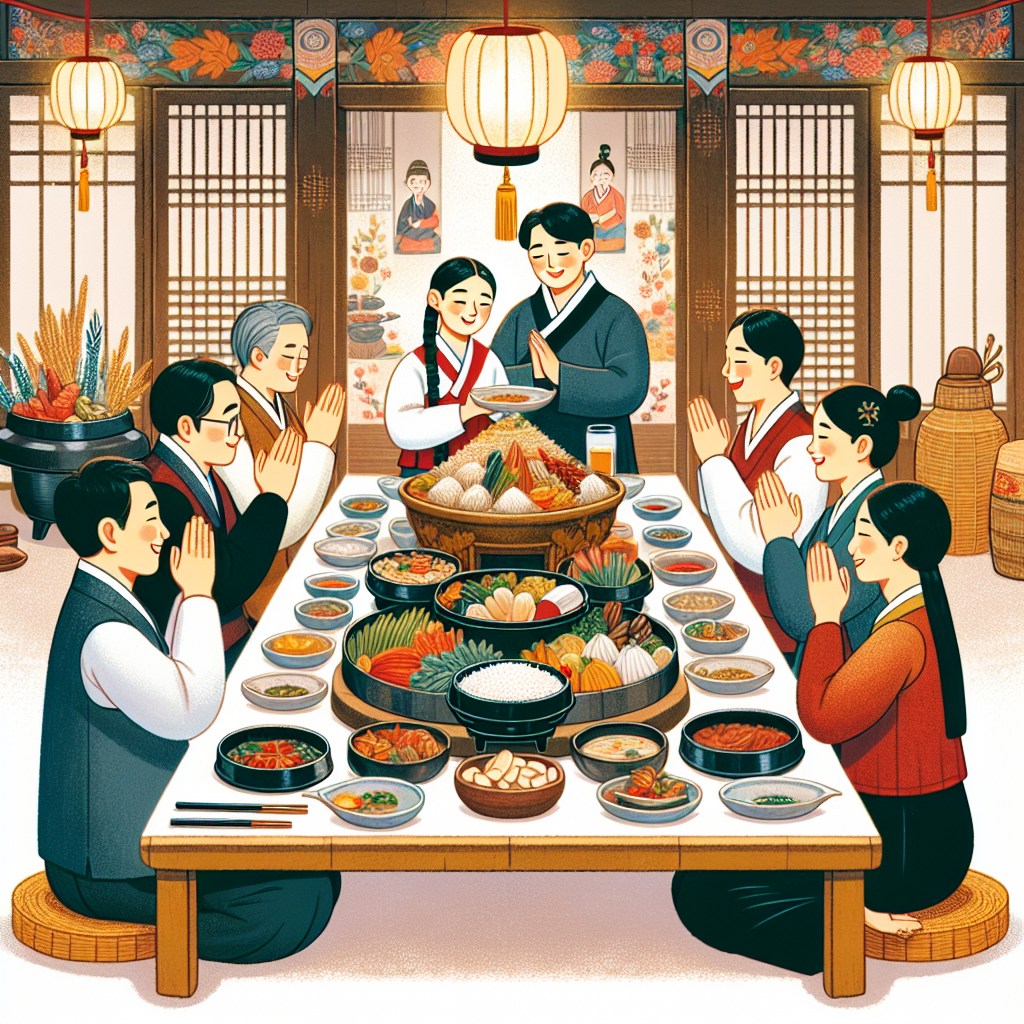Imagine sitting down to a delicious meal in Korea, surrounded by the vibrant colors and tantalizing aromas of Korean cuisine. As you take your first bite, you may not realize that there is something more than just flavor and technique at play. Korean cooking is deeply rooted in the concept of “bokshil” or the belief that food carries blessings. This idea, passed down through generations, has a significant influence on the ingredients, preparation, and presentation of Korean dishes. From the careful selection of ingredients to the meticulous attention to detail in cooking, the concept of “bokshil” imparts a sense of reverence and gratitude towards the nourishment that sustains us. Explore with us how this concept shapes the culinary traditions of Korea, creating a truly unique and heartfelt dining experience.

The Meaning of Bokshil
Food holds a significant place in Korean culture, not just as sustenance but also as a source of blessings and connections with ancestors and the community. The concept of “bokshil,” which translates to “blessing from food,” plays a pivotal role in Korean cooking. It encompasses traditional beliefs and practices, meal preparation, dining etiquette, special occasions, recipe development, regional variations, and its influence on modern Korean society. Understanding the meaning and influence of bokshil allows us to appreciate the deep symbolism ingrained in traditional Korean cooking.
Etymology of Bokshil
The word “bokshil” derives from a combination of two Korean words, “bok” meaning “blessing” or “fortune,” and “shil” meaning “from” or “derived.” This term encapsulates the notion that food not only nourishes the body but also brings blessings and good fortune to those who partake in it. It reflects Koreans’ belief that consuming food with gratitude and mindfulness enhances its positive impact on their lives.

Traditional Beliefs and Practices
In Korean culture, food has always been regarded as a gift from nature and the ancestors. Traditional beliefs emphasize the importance of showing respect and gratitude for the food received. Rituals and ceremonies are held to honor the spirits and ancestors, seeking their blessings for a bountiful harvest and a fulfilling life. These practices not only express gratitude but also create a sense of community and harmony among the people.
Bokshil and Korean Cuisine
Food as a Source of Blessings
The concept of bokshil considers each meal as an opportunity to receive blessings and positive energy. Koreans believe that the quality and intent behind the food preparation directly influence the blessings it brings. A well-prepared and thoughtfully cooked meal is believed to have a higher level of bokshil, enriching the dining experience and promoting well-being.
Ingredients with Symbolic Meanings
Korean cuisine incorporates ingredients with symbolic meanings, further emphasizing the concept of bokshil. For example, mushrooms symbolize longevity, while chestnuts represent the wish for fertility and prosperity. These ingredients are often used in festive dishes to enhance the blessings associated with celebratory occasions.
Restraint and Moderation in Eating
Bokshil also emphasizes the importance of restraint and moderation in eating. Koreans believe that overindulgence in food can disrupt the balance of blessings and hinder the positive energy derived from it. By practicing moderation, individuals can fully appreciate the blessings within each meal and maintain a harmonious relationship with food.

The Role of Bokshil in Meal Preparation
Ceremony of Preparing Food
Meal preparation in Korean culture is not merely a task but a ceremonial process that carries profound meaning. Every step, from selecting ingredients, washing, and cutting them, to cooking and arranging the final dish, is performed with care and respect. This attention to detail is believed to enhance the bokshil of the food, ensuring that those who partake in it receive the maximum benefits and blessings.
Importance of Presentation
Bokshil is not only rooted in the taste and quality of the food but also in its presentation. Koreans believe that well-presented food stimulates the senses and enhances the overall dining experience. The arrangement of colors, textures, and shapes in a harmonious manner not only pleases the eyes but also signifies the reverence and care put into the meal. Presentation is an essential aspect of bokshil, as it signifies the intention to create a visually appealing and spiritually meaningful dining experience.
Connection with Ancestors and Community
Bokshil also emphasizes the connection between individuals, their ancestors, and the community. Koreans believe that by honoring the food and sharing it with others, they are connecting with their ancestors who have provided for them and their community. The act of sharing food fosters a sense of unity and togetherness, spreading the blessings of bokshil to those around them.
Bokshil in Dining Etiquette
Sharing and Serving Food
In Korean dining culture, sharing and communal eating are integral. The etiquette of sharing and serving food reflects the concept of bokshil. The practice of serving others before oneself and ensuring everyone’s needs are met cultivates a spirit of generosity and abundance. It symbolizes the desire to share blessings and good fortune with others, promoting harmony and goodwill within the group.
Bowls and Utensils
The choice of bowls and utensils in Korean dining also holds symbolic meaning related to bokshil. Traditional Korean ceramic bowls known as “buncheong” or “hwangto” are often used as they are believed to enhance the flavor and quality of the food. Utensils made from bamboo or wooden material are preferred as they are considered more natural and in line with the concept of bokshil.
Proper Behavior at the Table
Observing proper behavior at the dining table is crucial to demonstrate respect for the food, fellow diners, and the concept of bokshil. This includes using chopsticks and spoons appropriately, not wasting food, and maintaining a calm and respectful demeanor. Such behavior fosters an environment of gratitude and mindfulness, further enriching the bokshil associated with the meal.

Bokshil and Special Occasions
Celebratory Feasts
During special occasions such as weddings, birthdays, and holidays, Korean families come together to celebrate through feasts filled with symbolic dishes. These dishes are meticulously prepared to incorporate bokshil, ensuring that the occasion is blessed with good fortune and joy. The feasts serve as a way to express gratitude for the blessings received and to share the happiness with loved ones.
Ceremonial Foods
Certain foods have ceremonial importance in Korean culture and are prepared with meticulous attention to detail. Examples include “tteok” (rice cakes) for ancestral rituals and “jjim” (steamed dishes) for ancestral memorial ceremonies. These foods not only symbolize the blessings bestowed by the ancestors but also honor their memory and demonstrate gratitude for their contributions.
Rituals and Prayers
Rituals and prayers are an integral part of special occasions in Korean culture. These rituals are regarded as a means to connect with the spiritual realm, seeking blessings, protection, and guidance. Food plays a vital role in these rituals, as it is offered as a gesture of respect and gratitude to the deities and ancestors, ensuring their continued blessings and support.
The Influence of Bokshil on Recipe Development
Traditional Recipes Passed Down Through Generations
Korean cuisine is rich in traditional recipes that have been passed down through generations, each incorporating the concept of bokshil. Many of these recipes focus on utilizing ingredients with symbolic meanings and incorporating specific cooking techniques that preserve the essence of bokshil. The transmission of these recipes ensures the continuity of the blessings associated with the food and maintains a strong cultural identity.
Incorporating Bokshil into Modern Cuisine
While traditional recipes form the foundation of Korean cuisine, modern chefs are also incorporating the concept of bokshil into contemporary dishes. The use of fresh, locally sourced ingredients, and the conscious approach to cooking and presentation, are ways in which bokshil is incorporated into modern Korean cooking. This ensures that even in a rapidly changing culinary landscape, the essence of bokshil remains embedded in Korean cuisine.
Preservation of Cultural Identity
Bokshil plays a crucial role in preserving the cultural identity of Korean cuisine. It serves as a reminder of the deep-rooted traditions and values associated with food. By valuing the concept of bokshil and passing it on to future generations, Koreans ensure the continued appreciation and practice of their culinary heritage.
Regional Variations of Bokshil
Different Beliefs and Practices
While the concept of bokshil is prevalent throughout Korean cuisine, there are variations in its interpretations and practices across different regions of Korea. Each region has its own unique customs and beliefs related to food and blessings. These variations showcase the diversity and richness of Korean culinary traditions, further enriching the overall understanding of bokshil.
Unique Ingredients and Dishes
Regional variations of bokshil are also reflected in the use of unique ingredients and dishes. Local specialties and traditional recipes specific to certain regions incorporate ingredients that may not be commonly found elsewhere in Korea. By utilizing these ingredients, regional cuisines add their distinct flavor to the concept of bokshil, creating a diverse tapestry within Korean cooking.
Regional Festivals and Celebrations
Regional festivals and celebrations provide an opportunity to showcase the regional variations of bokshil. These events often highlight local dishes, ingredients, and cultural practices, allowing people from various regions to come together and celebrate the richness of their respective culinary traditions. Through these celebrations, the significance of bokshil as a unifying factor in Korean society is reinforced.
Bokshil in Modern Korean Society
Continuation of Traditional Practices
Despite the influence of globalization and modernization, the concept of bokshil continues to hold significance in Korean society. Traditional practices associated with bokshil, such as ancestral rituals and communal feasts, are still observed and cherished by many Koreans. This demonstrates the continued appreciation for the blessings that food brings and the desire to maintain a connection with cultural roots.
Bokshil in Contemporary Culture
Bokshil has found its place in contemporary Korean culture beyond the realm of traditional practices. It is not uncommon to find bokshil-themed cooking shows, books, and other media that educate and promote the concept to a wider audience. This increased awareness allows Koreans and people from around the world to appreciate the symbolism and spiritual significance that bokshil adds to Korean cooking.
Educational and Promotional Efforts
Educational institutions and organizations in Korea have recognized the importance of preserving and promoting the concept of bokshil. They offer courses, workshops, and events that focus on the cultural significance of food and its relation to bokshil. These efforts aim to pass on the knowledge and practices to future generations and ensure the continued appreciation and understanding of bokshil in Korean society.
Criticisms and Debates Surrounding Bokshil
Religious and Superstitious Connotations
Bokshil, being rooted in traditional beliefs, may face criticism for its religious and superstitious connotations. Some argue that attributing blessings and positive energy to food might be seen as irrational or unscientific. However, it is essential to recognize that bokshil is not solely about religious beliefs but also about cultural values, gratitude, and mindfulness towards food and the community.
Cultural Restrictions and Expectations
While bokshil promotes gratitude and mindfulness, it can also create cultural restrictions and expectations around food. The emphasis on moderation and restraint may lead to feelings of guilt or social pressure when indulging in food. It is crucial to strike a balance by understanding that bokshil is not about strict rules but about cultivating a healthy relationship with food and being grateful for its nourishment and blessings.
Evolution and Adaptation
As Korean society continues to evolve, the concept of bokshil may face challenges in adapting to modern lifestyles and changing culinary preferences. Maintaining the essence of bokshil while embracing new cooking techniques and ingredients is a delicate balancing act. Recognizing the need for adaptation and open dialogue can ensure the continued relevance and appreciation of bokshil in contemporary Korean society.
Conclusion
The concept of bokshil, the blessing from food, permeates every aspect of Korean cooking, from traditional beliefs and meal preparation to dining etiquette and special occasions. It serves as a bridge between the physical and spiritual realms, fostering gratitude, unity, and harmony in Korean culture. While bokshil may face criticisms and challenges, its enduring influence and relevance are undeniable. By appreciating the symbolism and cultural significance of bokshil, we can gain a deeper understanding of Korean cooking and the profound connections it fosters.
